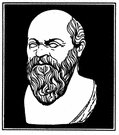The Life and Death of Socrates
Part 2: The Case Against Him Athens was nearly always a center for scholarship. Many of the people who found themselves doubting their understanding of things at the hands of Socrates were important people. It didn't take many of these instances before people began to form negative opinions of the philosopher. He was fond of saying, "The unexamined life is not worth living." Many people were quite happy not examining their lives, at least in the way that Socrates encouraged them to do. Also at this time, other philosophers were popular, asking and answering questions and examining life and politics and religion and all manner of other subjects. One of the major groups were the Sophists, who delivered philosophical pronouncements for money. However, Socrates, who worked so hard to distance himself from the Sophists, was lumped in together with them in the court of popular opinion. This link was cemented with the coming of the Aristophanes play The Clouds. The great comic playwright chose as his subject Socrates himself. In the play, which was seen by thousands of Athenians, Socrates is portrayed as a Sophist who believe in and preaches all sorts of un-Athenian things. The audiences who saw this play were made to laugh at the absurdity of it all, but the idea that Socrates actually believed in and did the things that Aristophanes's play had him doing soon became fact in many people's minds.
The Sophists, also, distrusted Socrates, especially because he was willing to teach young men without charging a fee, as they Sophists did. In a sense, they saw this as his taking business away from them. Another source of tension between Socrates and many people in Athens was his abhorrence of wealth. He went out of his way to speak out against great wealth, he had none of his own, and he taught his students that wealth was a bad thing, that it corrupted those who had it. Athens at that time was full of wealthy people, and they didn't trust someone who didn't believe as they did, that money was something to be gotten and kept.
Next page > Part 3: His Trial and His Death > Page 1, 2, 3 |
|
Social Studies for Kids
copyright 2002–2026
David White



 Add to this a resentment that people who were embarrassed by Socrates felt toward him, throw in a dose of distrust of the man who taught the sons of important people to question their parents' wisdom, and you have a strong case for why many people in Athens didn't at all like the man who kept telling them what they didn't know. (Also at this time, the
Add to this a resentment that people who were embarrassed by Socrates felt toward him, throw in a dose of distrust of the man who taught the sons of important people to question their parents' wisdom, and you have a strong case for why many people in Athens didn't at all like the man who kept telling them what they didn't know. (Also at this time, the  Socrates also taught that wisdom and the search for truth were the most important things of all, certainly more important than looking good or being physically fit or strong and athletic. For many, many years, Athens had been full of big, strong, athletic men who fought wars and participated in the Olympic Games and considered themselves fine human specimens. These people, too, didn't like Socrates saying that their strengths, their physicality, were nowhere near as important as their mental strength, which couldn't readily be seen. In a sense, Socrates liked to argue that strength in a person came from within, not from without: It wasn't how powerful your body looked on the outside but how powerful your mind worked on the inside that mattered to him.
Socrates also taught that wisdom and the search for truth were the most important things of all, certainly more important than looking good or being physically fit or strong and athletic. For many, many years, Athens had been full of big, strong, athletic men who fought wars and participated in the Olympic Games and considered themselves fine human specimens. These people, too, didn't like Socrates saying that their strengths, their physicality, were nowhere near as important as their mental strength, which couldn't readily be seen. In a sense, Socrates liked to argue that strength in a person came from within, not from without: It wasn't how powerful your body looked on the outside but how powerful your mind worked on the inside that mattered to him.
